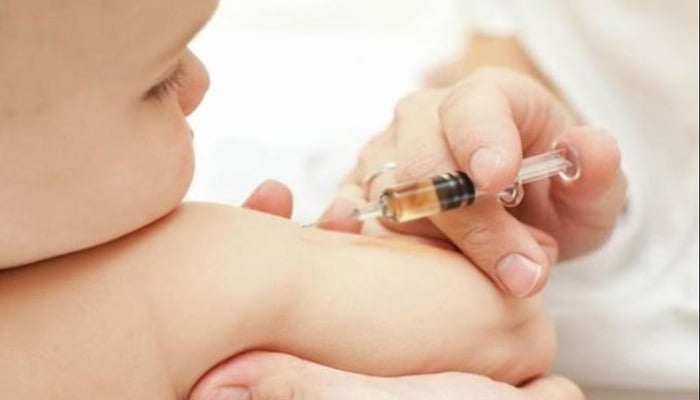Injectable polio vaccine drive to begin in city’s 88 UCs today
An immunisation drive to vaccinate children against the crippling poliovirus with the injectable Inactivated Polio Vaccine (IPV) will begin in 88 union councils of the city today.
The Sindh Emergency Operation Centre for polio will conduct the 10-day-long drive with the aim to reach 800,000 children who are between the ages of four and 59 months. The drive will be carried out completely in 23 UCs and partially in 65 UCs, while as many as 969,000 children under the age of five would also be given the Oral Polio Vaccine (OPV) drops.
This was revealed at a meeting of the officials of the Polio Eradication Initiative, the World Health Organization (WHO) and Unicef, district health officers, technical focal persons from federal and provincial EOCs and partner staff from various other organisations.
Sindh EOC Coordinator Fayaz Jatoi, while presiding over the meeting, said the situation of polio in Sindh and Karachi has greatly improved and it has been almost a year now since no wild polio case has been reported from the province.
“But the virus has shown up in the environment from time to time hence an IPV campaign is being launched to give children extra protection against the virus,” he added. Polio eradication officials said more than 1,200 fixed and outreach sites will be established in the city’s 88 UCs where parents will bring their children to get them vaccinated against polio.
Jatoi said that IPV is not a replacement for OPV. Instead it is an added protection for children who might fall prey to the virus. He added IPV is now also part of the routine immunisation schedule as well.
The government machinery including deputy commissioners, district health officers and town health officers will be implementing this campaign on the ground and there will be a high level of monitoring from EOC and partner staff, he said.
Last year, eight cases of polio were reported from the country, which is a historical low. This year, only three cases have been reported, all from Balochistan. Jatoi maintained that progress is clear in the figures but the efforts must remain sustained. He urged parents to bring their children for vaccination to ensure a healthy future for them.
“Parents should be informed that this campaign is taking place in 88 union councils of the city, completely and partially,” he said. “If the IPV campaign is not in their neighbourhood, they can go to the nearest government health facility and get their children immunised against polio and other childhood diseases free of cost.”
Officials and experts said people should be told repeatedly that polio is a highly-infectious disease that paralyses or kills children. The poliovirus usually affects children under five years of age who are not fully vaccinated and therefore not fully protected. Polio cannot be cured but can be prevented by full immunisation.
Since 1988, when the Global Polio Eradication Initiative was formed, the global incidence of polio has been reduced by more than 99 per cent and the number of countries with endemic polio transmission has fallen from 125 to two, Pakistan and Afghanistan.
IPV is given through an injection by a trained health worker in addition to OPV to strengthen a child’s immune system and maximise protection from polio. Following immunisation with IPV, it is essential that parents continue to vaccinate their children with OPV every time it is offered, said health experts, adding that IPV and OPV evoke different immune responses and when used together, maximise immunity to poliovirus.
In areas of known poliovirus transmission, IPV in addition to OPV will provide the greatest possible protection against poliovirus and therefore accelerate progress towards eradication, EOC officials said.
-
 Kate Middleton Knew Should Could Not Be ‘voice Of Reason’ With Prince Harry
Kate Middleton Knew Should Could Not Be ‘voice Of Reason’ With Prince Harry -
 Rihanna Has Wardrobe Malfunction At A$AP Rocky Fashion Show
Rihanna Has Wardrobe Malfunction At A$AP Rocky Fashion Show -
 Prince Harry Felt System Had ‘one Rule For Him, One For Prince William’
Prince Harry Felt System Had ‘one Rule For Him, One For Prince William’ -
 Jake Paul's Fiancée Sends Him Over The Moon Over Stunning Victory
Jake Paul's Fiancée Sends Him Over The Moon Over Stunning Victory -
 Why Prince William, Kate Middleton 'partnership' Is Important For Monarchy
Why Prince William, Kate Middleton 'partnership' Is Important For Monarchy -
 Katie Price Drama Escalates As Family Stays In Touch With Ex JJ Slater
Katie Price Drama Escalates As Family Stays In Touch With Ex JJ Slater -
 Critics Target Palace Narrative After Andrew's Controversy Refuses To Die
Critics Target Palace Narrative After Andrew's Controversy Refuses To Die -
 Sarah Ferguson’s Delusions Take A Turn For The Worse: ‘She’s Been Deserted’
Sarah Ferguson’s Delusions Take A Turn For The Worse: ‘She’s Been Deserted’ -
 ICE Agents 'fake Car Trouble' To Arrest Minnesota Man, Family Says
ICE Agents 'fake Car Trouble' To Arrest Minnesota Man, Family Says -
 Camila Mendes Reveals How She Prepared For Her Role In 'Idiotka'
Camila Mendes Reveals How She Prepared For Her Role In 'Idiotka' -
 China Confirms Visa-free Travel For UK, Canada Nationals
China Confirms Visa-free Travel For UK, Canada Nationals -
 Inside Sarah Ferguson, Andrew Windsor's Emotional Collapse After Epstein Fallout
Inside Sarah Ferguson, Andrew Windsor's Emotional Collapse After Epstein Fallout -
 Bad Bunny's Star Power Explodes Tourism Searches For His Hometown
Bad Bunny's Star Power Explodes Tourism Searches For His Hometown -
 Jennifer Aniston Gives Peek Into Love Life With Cryptic Snap Of Jim Curtis
Jennifer Aniston Gives Peek Into Love Life With Cryptic Snap Of Jim Curtis -
 Prince Harry Turns Diana Into Content: ‘It Would Have Appalled Her To Be Repackaged For Profit’
Prince Harry Turns Diana Into Content: ‘It Would Have Appalled Her To Be Repackaged For Profit’ -
 Prince William's Love For His Three Children Revealed During Family Crisis
Prince William's Love For His Three Children Revealed During Family Crisis




